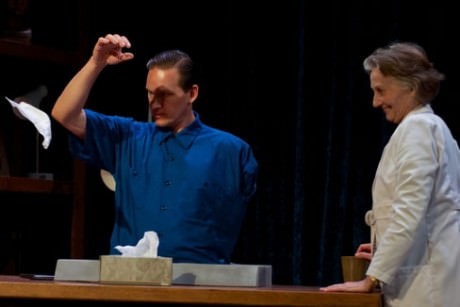We are definitely a culture acraze with technology. I-Phones are only on the lower end of the spectrum: we have virtual realities, simulated sports, robotic housecleaners, robotic warehouse workers, and all sorts of artificial intelligences waiting to assist us to drive, calculate, think, believe, do. In other words, it is no longer difficult for most of us to imagine that at some point in the not too distant future most if not all of a human being’s core functions might be replaced by technological simulations.
I. E., robots.
UncannyValley, a world premiere written by Thomas Gibbons and directed by Tom Dugdale, and now playing at Sheperdstown’s CAT Festival, taps directly into that tech-mania and does so fabulously.

Its challenge is, of course, to somehow make us forget the movies–all those movies that offer us robots, life-like and simulated, and aided by the technological know-how that is film’s bailiwick and at the center of its wheelhouse.
Fortunately, CATF has the perfect anecdote for celluloid. Alex Podulke. Mr. Podulke’s brilliant performance as the prototypical space age robot, Julian, stuns audiences, leaving us by play’s end in our own valley of uncanny feelings, no longer sure we are watching man or robot. Perhaps the future is now!
At play’s opening Julian is little more than a head on a countertop, speaking “robotics” (you know the voice–early computer telephone message). Soon however, engineers have added a torso and, with the aid of advanced artificial intelligence, i.e., learning as he lives, Julian’s articulation becomes subtle and his knowledge base and ability to decipher idiom greatly enhanced.
When Julian is given legs, we watch in amazement as he cruises around the room exploring his new found universe of multiple perspectives: yes, each time we change positions in a room we are seeing and experiencing the world anew–a million visions of a simple room molded into one!
Podulke’s sense of wonder and his excellent physical control makes our experience of his robotic Julian a delight. When his consciousness emerges in full (I won’t give away the plot here), we are completely swept off our feet at the transformation and at the ethical considerations.
Joining Podulke on stage is Barbara Kingsley as Claire. Claire is no robot but a scientist with two advanced degrees. Her life long work is reaching fulfillment with each step and decision Julian makes. Ms. Kingsley’s performance is strong and engaging.
Unfortunately, playwright Gibbons does not provide the audience with enough of her back story for us to fully appreciate her situation, which I content has as much to do with Julian’s story as anything in the script.
Claire has accomplished her success with Julian at a cost. Her own daughter, a rising scientist in her own right, years ago suddenly ended all communications with her mother and father and disappeared from the grid. The daughter is still alive but Claire knows not where. That void leaves a black hole in Claire and in the script, which begs to be filled. A promised revelation never materializes.
Thus, as Ms. Kingsley imbues her Claire with both the passions of the devoted scientist and the grief of a sincerely pained mother, we never come to understand her perspective on her daughter’s flight. It is an understanding we hungrily want as much as we want to understand Julian’s dueling identities. With Julian we find satisfaction; with Claire we are left wanting.
Dugdale and his design team have done a remarkable job constructing the technological aspects of Uncanny’s world. Video, designed by Michael McKown, is used extensively during the production, which adds to the uncanniness of the play’s perspective. Set Designer Jessi Dreikosen has created the sterile environment of Claire’s office; its large bookcase is oddly empty of artifacts. Costume Designer Therese Bruck gave Claire a real sense of style and earthiness, while Lighting Designer John Ambrosone intensified the sterility.
At the intellectual center of Uncanny Valley are the ethical questions that stir when synthetic life forms are considered.Today with have synthetic organs that extend life; tomorrow we might have synthetic bodies that provide us with eternity.
At the emotional core, however, lies an even more basic question of technology’s relationship with our own humanity, a humanity expressed most fully in our relationship with the young, be they our own children or the children of others.
Perhaps, technological advances like Julian, will render children obsolete, at least for those who can afford a new body and brain. For the rest of us, the nitty-gritty of childrearing, or teaching, or–you fill in the blank–will remain an endurance test.
Running Time: 90 minutes without an intermission.
The Contemporary American Theater Festival (CATF) runs through Aug 3, 2014. Performance tickets to CATF can be purchased through the Theater Festival Box Office, Monday to Friday from 11 am to 5 pm, by calling (800) 999-CATF (2283), or visiting online.
LINKS:
LINKS:
Learn more about the plays, and/or look at the full schedule.
Robert Michael Oliver’s review of ‘The Ashes Under Gait City’ on DCMetroTheaterArts.
Robert Michael Oliver’s review of ‘North of the Boulevard’ on DCMetroTheaterArts.
Robert Michael Oliver’s review of ‘Dead and Breathing‘ on DCMetroTheaterArts.
Robert Michael Oliver’s review of ‘Uncanny Valley’ on DCMetroTheaterArts
The Playwright’s Playground: ‘The Playmakers – CATF 2014: Interview With Ed Herendeen & Peggy McKowen Who Preview The Season.
The Playwright’s Playground: The Playmakers CATF 2014: Ed Herendeen & Peggy McKowen Discuss the Development of CATF Plays.
The Playwright’s Playground: The Playmakers CATF 2014: An Interview with Playwright Christina Anderson (‘The Ashes Under Gait City’).




